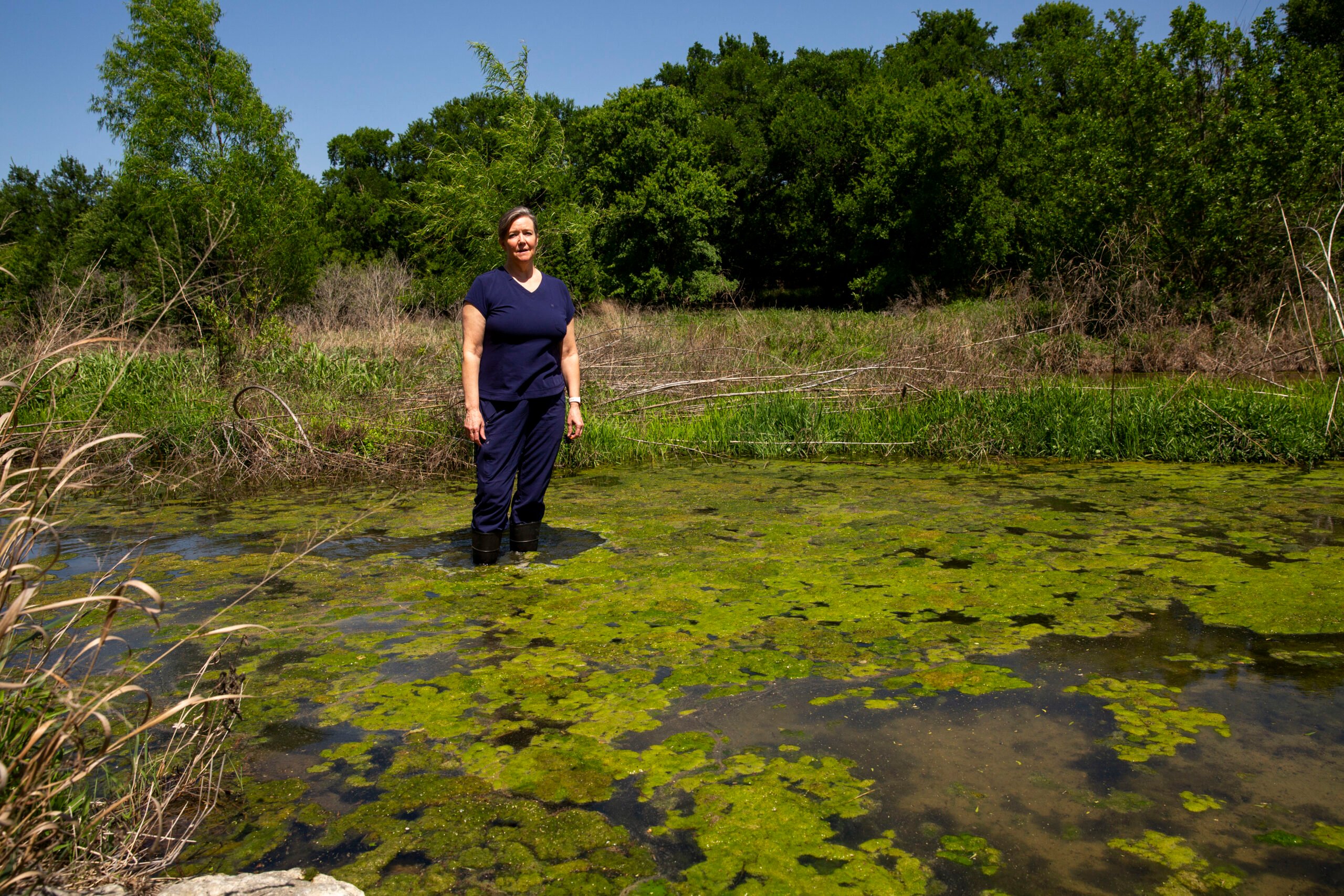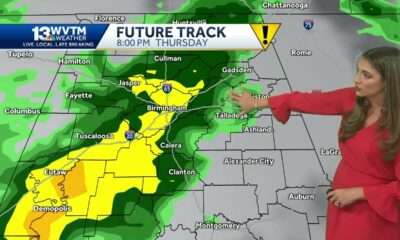News from the South - Texas News Feed
Trump’s policies strike fear into Texas immigrant communities
“A lot of fear going on”: Texas immigrant community on edge during Trump’s first weeks
““A lot of fear going on”: Texas immigrant community on edge during Trump’s first weeks” was first published by The Texas Tribune, a nonprofit, nonpartisan media organization that informs Texans — and engages with them — about public policy, politics, government and statewide issues.
Sign up for The Brief, The Texas Tribune’s daily newsletter that keeps readers up to speed on the most essential Texas news.
EL PASO — On a recent windy, cold afternoon in this border city, dozens of people gathered at a park for an immigrant rights demonstration to denounce the Trump administration’s immigration policies. Some held signs reading: “Immigrants Make America Great.”
Alan, a local police officer, and his wife came and held a Mexican flag. He said he joined the demonstration because he worries about his father, an undocumented immigrant who works at a farm in southern New Mexico.
Alan said he voted for Donald Trump because of worries about the economy and because he believes Trump is pro-police and would combat the public’s negative perception of law enforcement. He said he believed Trump’s promises to make everyday items affordable for middle-class families.
But after two weeks of Trump in the White House, Alan — who declined to give his last name because he fears retaliation against his father — said he now regrets his vote. Partly because he was angered when Trump granted clemency to people involved in the Jan. 6, 2021, attack on the U.S. Capitol.
And, he added, “I just don’t agree with how he’s going about the mass deportations.”
In his first week in office, Trump issued nearly a dozen executive orders, many of them targeting the estimated 11 million undocumented immigrants in the U.S. The Trump administration gave federal officers a national quota to arrest at least 1,200 undocumented immigrants every day — double the highest daily average in the past 10 years.
The sudden appearance of immigration officers combing the streets of Texas cities, which set off a flurry of social media posts as people documented their presence, has put undocumented Texans, educators, religious leaders, and business owners, among others, on edge, bracing themselves for the worst.
“There’s definitely a lot of fear going on,” said Ramiro Luna of Somos Tejas, a Dallas-based nonprofit focused on Latino civic engagement. “Our community feels threatened, and while we’re doing our best to provide information and peace of mind, it’s incredibly difficult. People are afraid to come to any gathering — even to get basic necessities.”
Undocumented and legal immigrants alike describe feeling anxious, angry, hopeless. Some say they’re changing their daily routines to reduce their chances of being swept up by immigration agents on the prowl.
Some classrooms once filled with the chatter of students now sit eerily quiet. Many undocumented parents, terrified of immigration raids, are keeping their children home. Some families, afraid of even the shortest drive, consolidate trips. Stepping outside feels risky.
Undocumented immigrants who have crossed the border without permission can be prosecuted for illegal entry, which is a misdemeanor. Immigrants who entered the U.S. legally but overstayed their visa have violated administrative immigration rules, which is not considered a crime. Federal courts have also ruled that living in the U.S. without legal status is not a crime.
Still, White House press secretary Karoline Leavitt said the U.S. government now considers undocumented immigrants criminals — whether or not they have been convicted of a crime.
“I know the last administration didn’t see it that way, so it’s a big culture shift in our nation to view someone who breaks our immigration laws as a criminal, but that’s exactly what they are,” she said.
Caitlin Patler, a public policy associate professor at the University of California, Berkeley, said Trump and other Republican leaders dehumanized immigrants during last year’s election cycle and constantly linked them to crime.
“Immigrants were scapegoated throughout the entire presidential campaign,” she said. “They’re convinced they are part of the crime problem, even though all evidence points to the contrary.”
Deported in the Rio Grande Valley
Geovanna Galvan is reeling from what she said is the unfair deportation of her father — who was recently cited for impeding traffic by a police officer from Primera, a small town in Cameron County.
On Wednesday, Jaime Galvan Sanchez, 47, was driving a tractor on a road near the farm where he’s worked for more than 10 years when a police officer stopped him. Less than 24 hours later, he was deported to Mexico, Galvan said.
Galvan, 29, said the police officer asked her father if he had any proof of legal residence. When he said he didn’t, the officer called federal immigration authorities.
Galvan Sanchez was able to call his daughter to tell her he was being detained by U.S. Border Patrol. She tracked his cellphone to a Border Patrol station in Harlingen and drove there with documents — utility bills, tax documents and property records — to prove he had lived in the U.S. for more than two decades, but she said officers didn’t allow her to see her father.
She was told her father would be allowed to call her, but she didn’t hear from him until the next morning when he called from Reynosa, a Mexican border city across the Rio Grande from McAllen.
“They just treated him as if he was nothing,” Galvan said.
She said immigration authorities deported him based on a misdemeanor theft conviction from 1991. But she is adamant that he couldn’t have committed the crime because he would’ve been 14 at the time and he arrived in the U.S. from Mexico in his 20s.
“My dad is not that person,” she said.
Her biggest worry is her 10-year-old brother, who suffers from epilepsy and hyperinsulinemia –– an excess of insulin in the blood –– and depends on their dad’s income to afford his medication.
“It’s not fair they’re separating families, especially when you have children or kids that need their parents,” she said. “My little brother needs my dad.”
Both her father and mother are undocumented but prior to this week, she had never been worried that her family would be vulnerable to deportation because she believed authorities would only target people with criminal records.
“Now my little brother doesn’t want to go to school because he thinks that when he comes home, my mom is not going to be there,” she said.
Primera officials did not respond to the Tribune’s request for comment but issued a statement on Facebook stating that its police officers do not participate in deportation efforts.
On Friday, immigration authorities allowed Galvan Sanchez to re-enter the U.S. with an ankle monitor and a notice to appear before a judge in March, according to his attorney, Jaime Diez.
Anxiety in schools
The anxiety reaches deep into schools. Many parents have reached out to ImmSchools, a nonprofit organization that supports educators and immigrant students, for guidance, unsure how to comfort students or reassure parents that school is still safe.
Teachers, too, are struggling. At a recent virtual Know Your Rights session by the nonprofit about 150 parents and educators shared stories of how fear has upended their daily routines — students breaking down in tears, fearful that their parents will be deported while they sit in class.
The Trump administration also has said that immigration agents are allowed to enter public schools, health care facilities and places of worship to arrest undocumented immigrants. Previous administrations had prevented agents from entering those sites.
“A family mentioned that they are eight minutes away from school, but even those eight minutes from and to [school] felt like too much,” said Lorena Tule-Romain, co-founder of ImmSchools. “They were asking if there are online schools or can schools provide virtual zoom classes instead.”
For students, the emotional toll is immediate. Teachers have told the organization that some children are withdrawn, others refuse to participate in class and many are visibly anxious.
“How they show up in the classroom, their mental health, their confidence — it’s all affected by their immigration status,” Tule-Romain said.
Brenda Gonzalez, the organization’s Texas-based associate director, said teachers are reporting low attendance in classes. She said absences put students at risk of falling behind or even being held back because students have to complete a certain number of hours to be promoted to the next grade level.
Legal advice for immigrants
Dallas-based immigration attorney Daniel Stewart said permanent residents are rushing to apply for citizenship, while immigrants who have been given Temporary Protected Status, especially Venezuelans, are desperate for more permanent protections, fearing the next policy change could strip them of their legal status.
Temporary Protected Status is a program Congress created in 1990 that allows immigrants from countries struck by natural disasters or deemed too dangerous by the government to live and work in the U.S.
“There’s a lot of trepidation,” Stewart said. “People are worried about what will happen to their pending cases and whether they’ll still be protected under new policies.”
Stewart notes that Trump’s more aggressive executive orders and rhetoric are fueling uncertainty. For undocumented immigrants, he stresses the importance of staying out of legal trouble because even minor offenses could lead to detention and deportation.
“Unfortunately, many undocumented individuals have no path to protection. It’s tough,” he said. “My advice is obey the law, stay informed, and seek legal counsel when needed.”
Mexican government offers app for emergencies
At the Mexican Consulate in Dallas, the phone keeps ringing — worried voices asking urgent questions: What should I do if immigration officers stop me? Who do I call if I’m detained? Is it safe to go to work?
In response, the consulate has ramped up its efforts to support Mexican nationals living in the U.S., expanding legal services and launching new tools to ensure immigrants have access to help when they need it most.
Consul General Francisco de la Torre says he is trying to reassure the community that they are not alone.
“We stand with you, especially during these dark, challenging times,” he said.
One of the Mexican government’s efforts to help its citizens in the U.S. is the ConsulApp Contigo, a mobile application available on Android and iOS that lets users store family contact information, and if they are detained, a single press of a button alerts their relatives and the nearest Mexican consulate.
“It’s not a panic button,” de la Torre said, “but it ensures that your loved ones and the Mexican government know something is happening.”
The consulate has a network of more than 300 law firms across the U.S. to provide legal assistance, particularly in immigration, criminal, and family law cases. In Dallas-Fort Worth alone, hundreds of lawyers are available to offer guidance — no appointment necessary.
As fear spreads, so does misinformation, especially on social media, said de la Torre. Rumors of massive workplace raids have fueled panic, with some immigrants afraid to leave their homes.
De la Torre urges the community to rely on verified sources for information. He said they maintain regular communications with the local Immigration and Customs Enforcement field office, which sits just across the freeway from the consulate.
“Our role is not to cut off dialogue — it’s to improve it,” he said. “Clear communication allows us to better protect the human rights of our community.”
The consulate provides a 24-hour emergency services for cases involving detention, deportation, repatriation, and rights violations. Mexican citizens in Texas can call 520-623-7874 for immediate assistance.
Disclosure: Facebook has been a financial supporter of The Texas Tribune, a nonprofit, nonpartisan news organization that is funded in part by donations from members, foundations and corporate sponsors. Financial supporters play no role in the Tribune’s journalism. Find a complete list of them here.
This article originally appeared in The Texas Tribune at https://www.texastribune.org/2025/01/31/texas-immigrants-undocumented-trump-deportation/.
The Texas Tribune is a member-supported, nonpartisan newsroom informing and engaging Texans on state politics and policy. Learn more at texastribune.org.
News from the South - Texas News Feed
Dish Soap: The Versatile Cleaning Hero You Didn’t Know You Needed
SUMMARY: Dish soap is a versatile cleaning tool that goes beyond washing dishes. It can remove hair dye from skin, clean makeup brushes, reduce condensation on windows, stop squeaky doors, and even clear clogged drains. Dish soap works as a gentle insecticide for plants and is effective for cleaning various surfaces. Consumer Reports highlighted top picks, with Dawn Ultra praised for its suds and Gain Ultra Clean for affordability. However, dish soap shouldn’t be used in dishwashers or washing machines as it creates excess suds that can damage appliances. Additionally, excessive use on skin or hair can strip natural oils.

Discover the incredible versatility of dish soap, a kitchen staple that does more than just cut through grease. Consumer Reports unveils how this soapy superhero can tackle a variety of messes around your home, making it the secret weapon hiding in plain sight.
News from the South - Texas News Feed
Mostly cloudy, slight chance of storms west of SA tonight
SUMMARY:
Title: Mostly cloudy, slight chance of storms west of SA tonight.
Summary: Good Monday morning! I’m meteorologist Justin Horn sharing the forecast. Today will be mostly cloudy with temperatures near 90. Although there’s a slight chance of showers tonight due to potential storms from Mexico, it’s unlikely to impact the river parade. Tomorrow should remain quiet, but expect increased rain chances midweek, particularly Wednesday evening with possible strong thunderstorms. A 40% chance of rain is forecast for Wednesday, along with similar chances on Thursday and Friday. Stay weather-aware, especially with ongoing Fiesta events, but no need to cancel plans.

Better chances of rain by midweek.
News from the South - Texas News Feed
In Booming Central Texas, Wastewater Is Polluting Rivers and Streams
Editor’s Note: This article originally appeared at Inside Climate News, a nonprofit, independent news organization that covers climate, energy, and the environment. It is republished with permission. Sign up for their newsletter here.
Margo Denke set out to rally the town when she learned that a Christian youth camp planned to build a wastewater treatment plant and discharge its effluent into the pristine Hill Country creek that ran through her small ranch.
Denke, a 1981 graduate of Harvard Medical School who moved to the Hill Country in 2013, printed fliers, put them in Ziploc bags and tied them to her neighbors’ cattle gates in the tiny community of Tarpley, population 38. A coalition of families pooled resources, hired a lawyer and dug in for a yearslong battle.
Theirs was one of many similar struggles that have unfolded in recent years across Central Texas, where protection of creeks and rivers from treated wastewater discharge often falls to shoestring community groups as an onslaught of population growth and development pushes ever deeper into the countryside.
“All this would have been destroyed,” Denke said in April as she surveyed a spring-fed stretch of Commissioners Creek. “Raising the money to fight this is not easy. But you have to, you can’t let this just slide by.”
Eventually, the camp owner, who did not respond to a request for comment from Inside Climate News, agreed in settlement negotiations not to discharge into the creek. Instead, they would spray their treated effluent over their own property—an increasingly popular means of wastewater disposal. In exchange, the neighbors would drop their opposition to the two-story dam the camp erected for a private lake and waterpark on little Commissioners Creek.
“I’m trying to stay positive about it,” Denke said. “It was a huge win.”
But the battle never ends amid the rapid pace of development in Texas. Several miles downstream, another subdivision developer wants to treat wastewater and discharge it into Hondo Creek. And in a neighboring watershed, another community group recently stopped another Christian youth camp from discharging into the Sabinal River.
Similar stories repeat throughout Central Texas, where two decades of booming population growth have come with a massive increase in domestic wastewater—mostly human sewage. The effluent from wastewater treatment plants appears clean and clear, but it contains high levels of organic nutrients that can cause algae blooms and devastate native aquatic ecosystems when dumped into streams and rivers.

“Unfortunately, society at large has no idea,” said Jeff Back, a staff scientist at Baylor University who has studied nutrient pollution in Texas waterways for 20 years. “Developers want to continue to do their business, but they need to be responsible.”
Now, as the state Legislature meets for its biennial session, advocates for water protection are supporting a bill that would prohibit most new discharges of treated wastewater into the state’s last 21 stretches of pristine rivers and streams, as defined by measured nutrient levels. Filed by state Sen. Sarah Eckhardt, a Democrat from Austin, it’s the latest iteration of a bill that groups have tried repeatedly without success to pass in Texas.
It wouldn’t ban development along pristine streams. It would just require other outlets for treated wastewater beside the natural waterways. Plenty of solutions are available on the market, from systems for onsite re-use to treatment methods that remove the nutrients from wastewater.
“People have to understand that it’s not going to be free,” Back said. “People want to do everything as cheaply as possible.”
The luxury of doing things cheaply might not last forever. As Texas cities begin to outgrow their water supplies and state leaders increasingly recognize shortages looming on the horizon, there may come an end to the days of showering lawns with drinking water while dumping treated effluent into rivers for disposal.
“This effluent should be considered a resource, not a nuisance to get rid of,” said David Venhuizen, a civil engineer in Austin who sells hardware for on-site water reuse.
It could be used to irrigate and fertilize the turf grass of parks, sportsfields, golf courses and private lawns, which make up the bulk of municipal summertime water use in Texas. In existing cities, such reuse has proven prohibitively expensive because plumbing from wastewater treatment plants is expensive to run out to individual customers.
New development, however, could be built to incorporate on-site wastewater reuse, said Venhuizen. His system, buried underground like a septic system, can treat a household’s wastewater, then drip it beneath the lawn. It could also be adapted at neighborhood scale for subdivisions to create a decentralized network of wastewater treatment and local redistribution.
But the breathless pace of suburban sprawl in Texas leaves no time to pause and make systemic changes. Instead, Texas cities run pipelines to distant aquifers to meet the ever-growing needs of new neighborhoods that will use most of their drinking water on lawns while piping away their effluent for treatment and discharge into a creek.
“We’re going to continue to rely on extraction instead of any regenerative kind of water systems,” said Venhuizen, 78, on a rocking chair in his backyard fitted with rainwater collection tanks and covered in native plants. “The madness has to stop.”
Stephanie Morris bought a house on the South Fork San Gabriel River, 27 miles north of Austin, in 2013. She wouldn’t have done it if she knew what the beautiful river would become.
When she and her family moved in, Morris said, the neighbors were already exhausted by a long-running battle with the neighboring city of Liberty Hill over its discharge of treated wastewater into the river about a quarter mile upstream.
Back then, Liberty Hill had about 1,000 residents, and its discharge created relatively minor algae problems in the river. Then its population exploded, like many other small cities of Central Texas. Now almost 15,000 people live in Liberty Hill, most of them relying on the South Fork San Gabriel for their wastewater disposal needs.
“There’s a hell of a lot more people pissing in the pond,” said Morris, a high-risk labor and delivery nurse, as she trudged through the green, mucky river in high rubber boots. “Every year things would get worse as their volume increased.”
All those nutrients, primarily from human waste, have caused the riverbed to choke up entirely with algae at times, extending three to five miles downstream and burying native ecosystems. When the algae dies, it sinks and rots in heaps of black, stinking muck.
Year by year, Morris became increasingly involved, until she spent all of her free time trekking the riverbed and taking photos of the destruction to show to her elected representatives, commissioners of the TCEQ and judges at the administrative law courts in Austin.
As a result, the TCEQ has twice reduced the concentrations of phosphorus that the Liberty Hill plant is permitted to discharge, although its overall volume continues to increase. The river looks better today than it did several years ago, Morris said. But the fight has nearly exhausted her.
“This has cost so much time and money, it’s not even funny,” she said. “Private citizens should not have to be enforcing the environmental standards of the state.”
The story of the South Fork San Gabriel, and the pictures that circulated online, jolted other communities to fight against proposed discharges in their areas, said Annalisa Peace, executive director of the Greater Edwards Aquifer Alliance, a group that helps its member organizations challenge the proposed discharge permits in the 21 counties that overlie the Edwards and Trinity aquifers.
“It’s incumbent upon the citizens and GEAA to raise the money for the legal fees to do all this,” Peace said. “It seems to be that the burden is placed on the average citizen.”
Most new wastewater sources come from new housing subdivisions and the municipal utility districts that are established to serve them, she said. Others are commercial projects, from summer camps to music venues, that plan to treat their own wastewater. Much of the new construction, especially near pristine streams, takes place outside of any city’s jurisdiction so it faces little regulation or oversight.
Previous attempts to pass statewide regulations of discharges into waterways have repeatedly failed, said Peace, who has worked with GEAA for 20 years. Much of the resistance comes from lobbying by major homebuilding companies that are making big money off explosive population growth in Texas.
“It’s the big nationals that we’re really seeing the most intransigence and the most organized opposition from,” she said. “They don’t like regulation.”
The Texas Association of Builders declined to comment on this report.
Peace wishes for a law increasing treatment standards for wastewater discharge into all Texas waterways. But she’ll settle for the current bill, which protects just the remaining pristine segments, and provides exemptions for cities and river authorities.
Outside the Texas Legislature, groups have had more success challenging individual permits. Such was the case on the Upper Sabinal River, where another Christian youth camp, operated by the national nonprofit Young Life, proposed in 2019 to build a wastewater treatment plant that would discharge into the river. Local landowners rallied. They gathered 25,000 signatures on a petition and hired a lawyer to challenge the discharge permits.
Faced with an extensive delay in state administrative courts, Young Life opted to settle instead. Young Life did not respond to a request for comment.
“Once this became a high-profile issue, they were willing to look at alternatives,” said Jeff Braun, a landowner on the upper Sabinal River and a spokesperson for the Bandera Canyonlands Alliance, which fought the permit. “I think it hit a chord with a lot of people that are native Texans because they all love these iconic streams.”
In an announcement of the settlement agreement in August 2021, Young Life said it would reuse most of its wastewater on-site for irrigation rather than discharging into the river. Regulators call this practice “land application,” and it’s growing in popularity.
By banning discharges into pristine streams, the bill in the Legislature would effectively force developers in those areas to use land application for wastewater disposal. Although the practice is less impactful to waterways than direct discharge, it can still do damage.
Mike Clifford, technical director at the Greater Edwards Aquifer Alliance, said that opposition from community groups has already pushed many developers to seek land application permits.
“The problem now is we just have too many of these,” he said. “They’re popping up everywhere.”
The TCEQ has issued 413 active permits for land application of treated wastewater, according to online records, and 2,374 active permits for discharge.
For example, community groups are currently fighting a planned 10,000-seat amphitheater, luxury hotel and condominium complex on 84 acres nestled next to the Barton Creek Habitat Preserve on Barton Creek, a pristine stream, in Austin. The complex would treat its own wastewater with land application permits to spray up to 120,000 gallons per day of treated effluent onto its property.
Over time, Clifford said, the nutrient pollutants would accumulate until a big rainstorm washes them into Barton Creek. About five miles upstream, on Fitzhugh Road, another proposed 5,000-person music venue wants to treat its own wastewater and discharge it into ponds near Barton Creek.
One solution, Clifford said, would be for Texas to require developers to add nutrient removal to their treatment process.
“It’s just about money,” he said. Nutrient removal “can double the cost of a wastewater treatment plant.”
With adequate investment, plenty of solutions exist. Some could even be configured to make money that covers part of their costs. For example, some treatment systems that remove nitrogen and phosphorus from water do it by growing algae, which could be harvested and sold as fertilizer. To avoid the buildup of nutrients where effluent is sprayed onto land, grasses can be harvested and sold as hay. Irrigation of hay for livestock is the largest water demand driving shortages in parts of Texas and the West.
Eventually, water scarcity will compel urban planners to make use of wastewater rather than dumping into rivers, said Brian Zabcik, advocacy director for the Save Barton Creek Association, which has pushed for discharge protections on Texas pristine streams through several successive legislative sessions.
“It’s crazy that we’re using our highest-quality drinking water to water our lawns and flush our toilets,” he said. “It makes a lot more sense to use recycled wastewater for those purposes.”
Texas might soon have to consider systemic changes as its population continues to boom, temperatures continue to rise, a multi-year drought persists and water shortages approach. Already, changes are beginning in small pockets.
Zabcik pointed to West Texas cities of Big Spring and El Paso, national pioneers in the reuse of treated effluent for drinking water. In Austin, a new city government building features on-site wastewater treatment and recycling for non-potable uses. Consumer products exist to do the same at any home, building or neighborhood.
These aren’t radical practices, said Zabcik, who lives on his grandparents’ ranch in Bell County. Conserving water was part of life for previous generations in Texas. For example, Zabcik said, his grandparents grew a garden, but not with their drinking water; they ran in a pipe from their stock tank. The water from their washing machine drained onto the lawn.
Passing protections on pristine streams won’t ban development along those stretches, Zabcik said. It will just require new approaches to wastewater use. Although they remain costly for now, prices may come down as necessity boosts demand for new affordable products.
The timeline will depend on whether Texas finds the political will to implement new wastewater systems in advance, or if it waits for scarcity conditions to force its hand.
“We’ve got to reuse every drop,” Zabcik said. “It’s really stupid to be wasting wastewater.”
The post In Booming Central Texas, Wastewater Is Polluting Rivers and Streams appeared first on www.texasobserver.org
Note: The following A.I. based commentary is not part of the original article, reproduced above, but is offered in the hopes that it will promote greater media literacy and critical thinking, by making any potential bias more visible to the reader –Staff Editor.
Political Bias Rating: Center-Left
The content reflects a strong focus on environmental conservation, community activism, and the impact of development on natural resources. It presents the struggles of local communities in Central Texas against wastewater discharge into pristine rivers, framing these efforts as necessary for protecting the environment. The mention of political figures such as Democrat Sarah Eckhardt and advocacy for regulatory changes indicates a tendency toward policies aimed at environmental protection, often associated with more progressive or center-left positions. The article also critiques the role of developers and industry in resisting regulation, which aligns with a broader environmentalist agenda.
-

 SuperTalk FM6 days ago
SuperTalk FM6 days agoNew Amazon dock operations facility to bring 1,000 jobs to Marshall County
-

 News from the South - Missouri News Feed2 days ago
News from the South - Missouri News Feed2 days agoMissouri lawmakers on the cusp of legalizing housing discrimination
-

 News from the South - Alabama News Feed7 days ago
News from the South - Alabama News Feed7 days agoPrayer Vigil Held for Ronald Dumas Jr., Family Continues to Pray for His Return | April 21, 2025 | N
-

 News from the South - Florida News Feed6 days ago
News from the South - Florida News Feed6 days agoTrump touts manufacturing while undercutting state efforts to help factories
-

 News from the South - Florida News Feed6 days ago
News from the South - Florida News Feed6 days agoFederal report due on Lumbee Tribe of North Carolina’s path to recognition as a tribal nation
-

 News from the South - Oklahoma News Feed6 days ago
News from the South - Oklahoma News Feed6 days agoOklahoma Treasurer’s Office Faces Scrutiny Over Use of Signal in Anti-ESG Coordination
-

 Mississippi Today4 days ago
Mississippi Today4 days agoStruggling water, sewer systems impose ‘astronomic’ rate hikes
-

 Mississippi Today1 day ago
Mississippi Today1 day agoDerrick Simmons: Monday’s Confederate Memorial Day recognition is awful for Mississippians









































